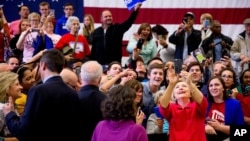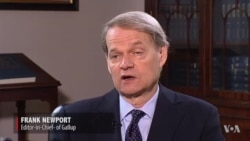With the U.S. presidential primary in its final months, one of the country's top pollsters says a dominant theme has emerged in how Americans view their government.
Frank Newport, the editor-in-chief of Gallup, told VOA that record numbers of Americans are dissatisfied with Congress and the government in general, and candidates such as Republican Donald Trump and Democrat Bernie Sanders have seized on that sentiment.
Sanders has argued that U.S. lawmakers have become too beholden to Wall Street and the influence of the wealthy, and he will prioritize populist programs such as universal health care and free college tuition. Trump has blasted U.S. trade agreements, which he says have cost Americans jobs, and pledged to radically renegotiate trade deals to better benefit American workers.
Newport says both candidates essentially argue that Congress has done little to improve voters' lives.
"A lot of these candidates are running against government. Bernie Sanders called it a revolution. Trump doesn't use that word but says we need huge changes in the way government works… and that does separate them from Hillary Clinton."
He says Clinton, after her decades of experience in government, is proposing incremental, instead of wholesale, changes. He says she favors using government the way it is to make things better for Americans.
Gallup is one of the United States' oldest public opinion polling groups, and has been regularly surveying the American public for decades to determine what issues voters care about. It also surveys voters to determine the level of public support for individual politicians, including President Barack Obama, whom Gallup says currently has an approval rating of 51 percent.
That relatively strong level of public support is favorable for candidates in the Democratic Party, even though historically, the White House has tended to swing to the opposition party after a president has served two terms.
Newport said that in order for Democrats to win the election in November, they must raise turnout among black voters, Hispanic voters and young voters who form a significant part of the party's base. Otherwise, he said the predominantly older white voters who form the core of the Republican Party's support could have enough numbers to carry their candidate to victory.






